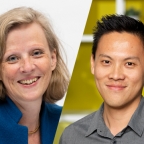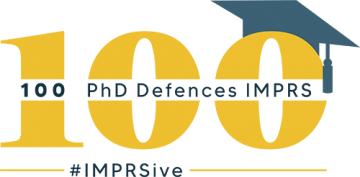The blossoming of an idea
An interview with coordinators Els den Os & Kevin Lam
To find out more about how the IMPRS got started and how it has evolved, we interviewed Els den Os, the first graduate school coordinator, and Kevin Lam, who took on the role in 2017.
We asked the former and current coordinator how they got involved with the IMPRS in the first place. For Els den Os, it all started when Steve Levinson asked her to help write the proposal for the IMPRS for Language Sciences. ‘At that time, I was head of the research office of the Faculty of Arts of the Radboud University, but I had worked at the MPI before as “officer for European affairs”, so I knew the Institute quite well. I had been a language researcher myself for many years. After the application was granted, I thought I would actually like to be the coordinator myself. And that is what happened: I started as the coordinator for one and a half day a week, to set up the school. There were funds to also hire an assistant, and the first person we hired was Rachel Sheer.’
Kevin Lam’s involvement started as a PhD candidate or ‘IMPRSer’ at the Donders Institute for Brain, Cognition and Behaviour. ‘Alongside my doctoral project, I was also actively involved in other supplementary roles, as a way to enrich my doctoral experience and discover different interests. By the end of my doctoral training, I had a greater affinity for pursuits that were not strictly research-based, but supported researchers instead. When the opportunity presented itself to become assistant coordinator for the IMPRS, I simply could not resist.’
When Kevin first took on the assistant coordinator role, he had anticipated spending the next few years learning the ropes from Els. ‘The learning curve was undoubtedly a steep one! Still, Els and Dirkje van der Aa ensured that the transfer of duties proceeded as smoothly as possible. Not long after, Els shared her plans to accept an offer for a position at the University of Amsterdam. Though I was delighted for her, I was less than thrilled that our collaboration would be cut short. Moreover, I was preparing for my doctoral defence that year, so the last thing I needed was the prospect of taking on greater duties and responsibilities so soon. However, looking back, I’m certain that my doctoral training, direct involvement in the IMPRS and supplementary roles elsewhere had prepared me for these challenges–more than I had realised.’
When Els was looking for a successor for Dirkje van der Aa, who was the assistant after Rachel Sheer, she already knew she would be leaving soon. ‘So I was looking for someone who already knew what it was all about. Earlier, Kevin had already expressed his interest in a coordinator position. I was sure that Kevin, given that he had been one of the students himself, would be an excellent coordinator. And, indeed, I was not wrong: Kevin took up this job in a perfect way! When I look back, I must say that although they all had very different personalities, I was very lucky with all three assistants.’
For Els, the challenge was to set up from scratch the practicalities of running the school. ‘The granted proposal was not very detailed on how the school should be run, what the processes and daily activities had to be. Fortunately, I had a very good relationship with Steve Levinson, the first IMPRS spokesperson and managing director at the time. I had a great amount of freedom to fill in the job. Steve, Rachel and I implemented, among other things, the progress tracking system, the IMPRS core courses and workshops, and the social events. I really enjoyed these social events, like the pub quizzes, the Sinterklaas evenings, and the Christmas dinners, where the international students brought their national dishes. I saw that during these events, exchanges between the different groups took place, and this is of course also one of the most important goals of the school: cross (disciplinary) boundaries.’
Kevin agrees: ‘Indeed, the international vibe is certainly hard to beat. I think the community benefits so much from being immersed in an environment enriched by different cultures, languages and scientific backgrounds. I also delight in collaborating with members that have a strong desire to make an impact within and beyond the community. Working alongside people with such drive constantly reminds me how fortunate I am to be part of this community.’
How do they see the future of the IMPRS? According to Kevin, interdisciplinary research will undoubtedly remain a central pursuit. ‘We need to continue to equip our students with interdisciplinary toolboxes, as well as take on the challenge in shaping some of these tools. Coupled with greater efforts to foster collaborations across partner institutes, we look forward to seeing how these efforts will re-define the landscape of language sciences. I also find it important to provide even greater support and preparation for a career beyond the academic borders. By equipping our graduates with a ‘discerning scientist’ mindset characterised by critical and lateral thinking, we could achieve a greater impact on society, as they eventually take on roles in the public and private sectors. We hope to show our members that their graduate training leads to many opportunities for making lasting contributions to society.’
‘More generally, the scientific pursuit can have a broader impact on society when we welcome different voices and perspectives’, adds Kevin. ‘We can do so by supporting those whose interests we may not directly see as relevant to our immediate selves. At the same time, we should not forget those who do not have the many advantages that we take for granted. I recognise that some degree of good fortune has helped me get this far. My hope is that we can make a greater impact for under-represented groups in academia, which will certainly shape its future leadership.’
Els thinks that the IMPRS for Language Sciences has successfully contributed to new ways of studying language, by bringing together so many different perspectives into one environment. ‘After all, that is the guiding principle of the IMPRS. I am convinced that the school will continue to break new ground, by bringing together insights from diverse fields and new disciplinary perspectives on language.’
[ back to top ]


Share this page